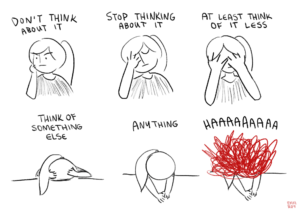Intrusive suicidal ideation is a type of suicidal thinking that pops into your head against your will. It can be very frightening and overwhelming. This type of thinking can lead to suicide attempts or completions. If you are experiencing intrusive suicidal ideation, it is important to get help right away. In this blog post, we will discuss what intrusive suicidal ideation is, and how to deal with it effectively.
Contents
Defining Intrusive Suicidal Ideation

It can be tricky because it varies from person to person. For some, it may be a single thought that enters their mind and quickly leaves again. For others, it may be a repetitive thought that won’t go away no matter how hard they try to ignore it or push it out of their mind. Intrusive thoughts are usually negative and can involve any number of topics, including death, self-harm, or suicide.
Suicidal OCD is a form of OCD in which intrusive thoughts about suicide become obsessions. These thoughts can be very distressing and may make you feel like you are going crazy. They can also lead to attempts or completion of suicide. If you have suicidal OCD, it is important to get help from a mental health professional right away. There are effective treatments available that can help you manage your symptoms and improve your quality of life.
Difference Between Suicidal Ideation And Obsession
The key difference between suicidal ideation and obsession is that intrusive thoughts are involuntary and unwanted, while obsessions are repetitive and persistent. Intrusive thoughts can be about anything, while obsessions are usually focused on a specific topic, such as death or self-harm.
Intrusive thoughts are a normal part of the human experience. We all have them from time to time. It’s only when they become persistent and intrusive that they can be diagnosed as an obsession.
Symptoms of Suicidal OCD

The most common symptom of suicidal OCD is intrusive thoughts about suicide. These thoughts can be so distressing that they interfere with your ability to function in day-to-day life. Other symptoms may include:
- avoidance of anything related to suicide
- compulsively checking for signs of suicide
- excessive worry about accidentally harming yourself or others
- feeling hopeless or helpless
- self-destructive behaviors such as substance abuse or self-injury
- repetitive behaviors aimed at suppressing suicidal thoughts
If you are experiencing any of these symptoms, it is important to seek professional help. There are treatments available that can make a big difference in your quality of life.
Causes of Suicidal OCD
There is no single cause of suicidal OCD. However, some risk factors may increase your chances of developing the condition. These include:
- having a family history of OCD or another mental health disorder
- experiencing trauma or abuse
- having a chronic medical condition
- using certain medications
If you have any of these risk factors, it does not mean that you will develop suicidal OCD. However, it is important to be aware of them so that you can seek help early if you start to experience symptoms.
Treatment For Suicidal Ideation

Intrusive thoughts can be very distressing, but there are effective treatments available. If you are struggling with intrusive thoughts, please seek help from a mental health professional. You don’t have to suffer alone. Help is available.
There are several effective treatments for intrusive thoughts, including:
Cognitive Behavioral Therapy (CBT): This is a type of therapy that can help you learn how to manage your thoughts and behaviors. CBT can be done with a therapist or on your own using self-help resources.
Exposure and Response Prevention (ERP): This is a type of therapy that involves exposure to the thing you are afraid of (in this case, suicide) and then practice not responding to it. ERP can be done with a therapist or on your own using self-help resources.
Medication: Some medications can help reduce the intensity and frequency of intrusive thoughts. If you are considering medication, be sure to talk to your doctor about the risks and benefits.
Conclusion
Intrusive suicidal ideation is a type of thinking that can be very frightening and overwhelming. If you are experiencing this type of thinking, it is important to get help from a mental health professional right away. There are treatments available that can make a big difference in your quality of life.
If you are looking for affordable Online OCD Counseling MantraCare can help: Book a trial OCD therapy session


